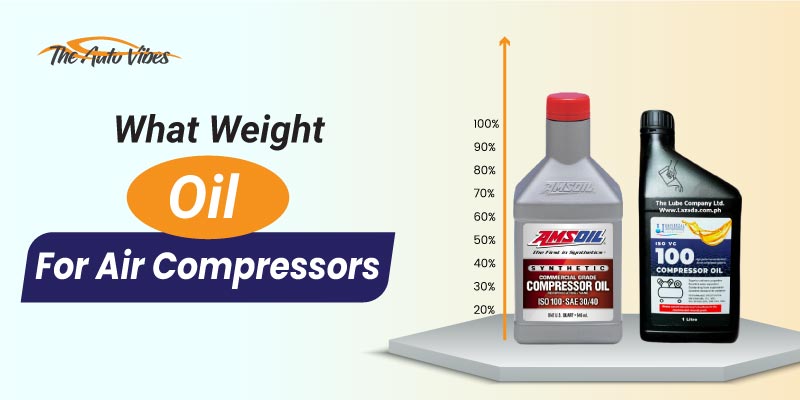Generally, air compressors use unique types of air compressor lubricant to restrict damage and enable them to last longer. Like cars, air compressors need the right weight of oil for the best performance. So, what weight oil is best for an air compressor?
Most air compressors are suited for 20-weight or 30-weight non-detergent compressor oil for optimum performance. Typically, 20-weight air compressor oil is recommended for colder environments, and 30-weight compressor oil is best for warmer environments.
But how will you determine the right weight of oil, or what is the importance of using the right weight oil? Of course, that is also crucial to know. That is why, here we have gathered all the info that you are searching for. So, read on.
What Weight Oil Does The Air Compressor Take?
Many people find it very confusing what weight of oil will be right for their air compressors. Of course, the manufacturer’s recommendation or the owner’s manual is the first thing to consider to avoid voiding the warranty.
But what if the owner’s manual is not nearby? Then the guide is just right for them! Many manufacturers of air compressors recommend using 20-weight oil or 30-weight oil for the users’ machines.
You know 30 weight oil is more viscous or thicker. Due to this, it makes the oil best suitable for hotter areas as it provides more protection.
During this summer season, it will cover the air compressor part better than the less viscous oil.
So, you can switch the oil to 30-weight oil when the weather changes to summer or when the temperature ranges from 34° to 100° F, and to the less viscosity of oil in the winter.
In this case, 20-weight compressor oil is best suited for colder weather. The weight oil is less viscous or less dense.
The weight of oil is an important matter to consider because if you use 30-weight oil when the temperature drops, the air compressor may not start immediately. Here 20 weight compressor oil will work better helping the ‘cold start’ conditions.
Of course, this distinction is important for users who are operating their air compressors regularly or daily. So, they may have to switch over from 20 to 30-weight oil for half of the air.
Do All Air Compressors Require Oil?
Air compressors require oil for constant lubrication and to prevent friction of moving parts like pistons and screws.
But that is not true in all cases as some air compressors can run even without oil. It is because they are already sealed and coated straight from the factory.
The air compressors that do not require lubrication are referred to as oil-free air compressors.
Oil-free compressors are often used in applications that require ultra-clean air with a very low carryover of oil like medical compressed air, food processing, laboratory applications, or pharmaceutical manufacturing.
Moreover, it is possible to get ultraclean compressed air even without having an oil-free compressor.
All of it will need proper filtration which will be enough to reduce oil carryover almost to zero.
Besides, an oil-lubricated air compressor has more life span than oil-free compressors.
It is because the oil-free compressors have no way to add oil when the lubrication wears off eventually. Oil-lubricated air compressors also function quieter than oil-free air compressors.
Importance of Using The Right Weight of Oil in Air Compressor
It is important to choose the right viscosity of oil in your air compressor to protect your engine and the vital mechanical components.
Moreover, it requires the right type of oil to keep the air compressor lubricated to deliver excellent performance.
However, let us see the importance of choosing the right viscosity of oil in detail.
#1- Heat Absorption
While functioning, the air compressor produces heat that is absorbed by the air compressor oil.
Thus air compressor oil keeps the engine cool. That means the right viscosity of air compressor oil absorbs the heat in the compression process and lets the compressor work at a lower temperature.
#2- Oxidation Resistance
Generally, air compressor oil contains additives. Due to these additives, the oil does not react with oxygen and also does not produce acid when it oxidizes.
So, when you use the air compressor oil of the right viscosity, it assists the air compressor in preventing corrosion and rusting of the motor.
#3- Maintaining Viscosity
The air compressor oil is designed to maintain the right viscosity specific for the air compressor despite the freezing temperature.
So, it is obvious you need to use the recommended viscosity of air compressor oil so as to protect the internal components and minimize the chance of unexpected breakdowns.
#4- Enhancement of The Lifespan of The Lubricant
Using the right viscosity of oil also extends the life of the grease. It also assists to protect the machine when it is on standby mode or makes the air compressor adaptive to any conditions.
#5- Demulsification
Moreover, the air compressor oil also contains additives as a water separation improver. Thus the right type of oil protects the air compressor from water and oil emulsion.
#6- Anti-Foaming Abilities
Moreover, the air compressor oil has anti-foaming abilities. When the big bubbles come to the surface of the oil, it produces foam.
As the surface is exposed to oxygen, it increases oxidation. With the anti-foaming abilities of the oil, it enhances the lifespan of the air compressor.
What Happens If You Use Wrong Weight Oil for An Air Compressor?
Where using the right weight of oil enhances the performance of the air compressor, the wrong weight of oil causes several severe problems. Here is the list of potential results of the action.
- It will cause poor lubrication, and as a result, there will be an increase in friction and heat.
- More frictional resistance and the increased temperature of the air compressor cause a subsequent seizure.
- Due to the use of the wrong type of compressor oil, there will be the formation of deposits and varnish inside the air end.
- Increased wear and tear, especially on the moving parts, and shortened the life of the equipment.
- Potential component failure.
- Decreased air compressor performance.
So, by any chance if you have used the wrong type of oil or if you have mixed two types, it is best to flush the oil as soon as possible as well as to replace it with the correct type of oil.
How To Determine Right Weight Oil for Air Compressors?
The first thing that you need to take into consideration while determining the right weight oil for your air compressor is the owner’s manual or the manufacturer’s recommendation.
Typically, the manufacturer’s recommendation will specify what type of oil will work best for your air compressor for peak performance.
So, you should abide by manufacturers’ warranty guidelines for the right weight oil determination for your specific make and model of air compressor.
But in case the guideline does not specify the type of oil, you can use standard 20-weight or 30-weight compressor oil. It is because this weight oil works just fine with almost every air compressor.
In this case, you should also take into consideration the climate conditions of your living area and usage patterns.

